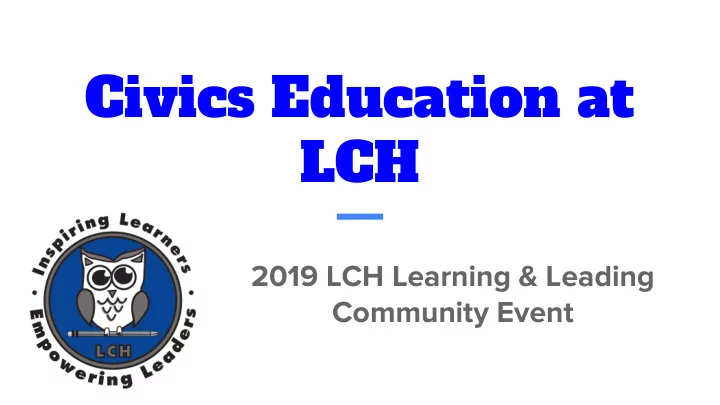

Civics Education at LCH 2019 LCH Learning & Leading Community Event
Presenters Olivia Besemer - 6th Grader Christie Kay - Principal Sophie Legaspie - 6th Grader Natalie Christ - 5th Grade Teacher Gabby Sansone - 6th Grader Erin Butson - 1st Grade Teacher Lucas Santos - 6th Grader
Social Studies Standards https://www.cde.ca.gov/ci/hs/cf/hssframework.asp
Adopted in July 2016 Published 2017
Six Research-Based Proven Practices in Civic Education PROVEN Discuss current local, national, and international issues and events in the PRACTICE #1: classroom, particularly those that young people view as important to their lives. PROVEN Design and implement programs that provide students with the opportunity to PRACTICE #2: apply what they learn through performing community service that is linked to the formal curriculum and classroom instruction. PROVEN Offer extracurricular activities that provide opportunities for young people to get PRACTICE #3: involved in their schools or communities. PROVEN Encourage student participation in school governance. PRACTICE #4: PROVEN Encourage students’ participation in simulations of democratic processes and PRACTICE #5: procedures. PROVEN Provide instruction in government, history, law, and democracy. PRACTICE #6:
PROVEN PRACTICE #1: Discuss current local, national, and international issues and events in the classroom, particularly those that young people view as important to their lives.
PROVEN PRACTICE #2: Design and implement programs that provide students with the opportunity to apply what they learn through performing community service that is linked to the formal curriculum and classroom instruction.
PROVEN PRACTICE #3: Offer extracurricular activities that provide opportunities for young people to get involved in their schools or communities.
PROVEN PRACTICE #4: Encourage student participation in school governance.
PROVEN PRACTICE #5: Encourage students’ participation in simulations of democratic processes and procedures.
PROVEN PRACTICE #6: Provide instruction in government, history, law, and democracy.
Student Voice Civics has led students to find their own voice! Empowered through learning experiences such as: Guest presenters ○ ○ Classroom lessons ○ Speaking parts in presentations ○ Paradigm shift Results! ○
Adult Voice It isn’t just our students who are being empowered….it’s the adults as well! YIMBY or NIMBY
Homelessness Persons who are homeless want the same things as all other people ● Want friends, family, loving home ● Sometimes there’s something that is getting in the way Fill-a-belly and volunteering experiences: ● Met people and learned how some even try and give back to the community despite being homeless ● Learned that homeless people are just like everyone else ● “After this learning, I realized that I didn’t really see them as people until after I started and learning about them.”
Family Challenge Act of 2018
Declaration of Human Rights Everyone has a right ot home and safety 5th & 6th Graders have been studying this through their civics learning
Process of government ● Government officials can’t just give directions People have a say in how things work ● ○ Democracy ○ Importance of voice ● Most of our laws today came from long ago and from different places ○ Ancient civilizations - had representatives and systems of government The way we do things today isn’t all that original ○
Ancient Influences Current rules of law were built on ancient systems/laws ● Clear and publicized (displayed) laws ● Branches of government ● Involving the people in government Separation of power (no one person can decide everything) ● ● Innocent until proven guilty
Judicial System experiences ● Walk through ancient civilization - included rules of law Mock trials - learned the process of court, the roles of people, the rule of ● innocent until proven guilty
1st Grade Civics Examples
Highlights ● What is a democracy? Who Gets to Make the Laws in a Democracy? Virtual Field Trip to the state capital to learn about how laws are made ● What Do You Do if the Law is Not Fair? Guest Expert - Owen Williams’s mom Talking about what to do if laws are not fair. Facilitated a mock trial with the students. We are taking recess away… What is your position?
Highlights ● What Does a Super Citizen look like? What do our World Ready Character Traits really look like? Discovering the biographies of Super Hero Citizens who have gone before us… ● What did Martin Luther King do to change the laws? What did Jane Addams do to change the laws for kids? What did John Muir & Teddy Roosevelt do to save our amazing places in nature?
Highlights Super Hero Citizen Project! ● What character traits, interests, and talents make me a super citizen? ● How can I use my strengths to help make my community better? ● How can I be an agent of change... As an individual? As a classmate? As a family member? As a soccer player?
California State Standards First Grade 1.1 Students describe the rights and individual responsibilities of citizenship. 1. Understand the rule-making process in a democracy. 2. Understand the elements of fair play and good sportsmanship, respect for the rights and opinions of others, and respect for rules by which we live, including the meaning of the "Golden Rule."
Recommend
More recommend